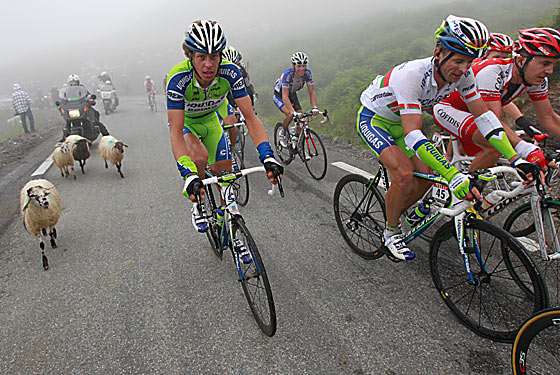
Sports Section bicycling correspondent Jada Yuan grew up watching four-hour silent Japanese feeds of the Tour de France because her dad needed more than ABC’s meager coverage. She’s covering the Tour (or TDF) until it ends on Sunday. Today’s installment: The most important stage, ever.
The weather for today’s final day of mountains in the Tour de France, a.k.a. the most important stage ever (unless Saturday’s time trial proves more important), was appropriately dark and gloomy. It had rained overnight in the Pyrenees and it was still raining or heavily foggy during the three major climbs of the day, including the incredibly difficult climb up the Col du Tourmalet where second-place Andy Schleck had promised to make his move on the yellow jersey of Alberto Contador. Was Contador less of a rider than he was last year, when he decimated everyone and won handily? Could Schleck gain the minute or more that he’d need to have a chance against Contador, who would surely beat him by at least that much in the time trial? Even French president Nicolas Sarkozy was watching, following along in a car as the Tour’s honored guest of the day.
Around 5km in, seven riders went off the front, none a threat for the overall win, followed solo by 2008 TDF winner Carlos Sastre, who is down in the overall standings but whose reputation as a guy who can climb and win stages prompted the peloton to speed up the pace. They caught him with 25km to go. Within the peloton, weird, significant things were happening to important players. Samuel Sanchez, in third place and leading fourth-place Denis Menchov by thirteen seconds, crashed hard on his chest during the flat run-up to the first climb. Contador, perhaps a little more conscious of race etiquette after Stage 15’s chain-gate, used his position as race leader to slow down the pace of the peloton so Sanchez could catch up. Which he did, though he seemed to be having a miserable time breathing for quite a while thereafter. Later on during the climb up the Col du Soudor, Contador, leading the peloton with other members of Team Astana, narrowly missed running into a pack of sheep dashing across the road. Sheep run wild in the mountains, and apparently they become more active during rain and fog. The pack let the front of the peloton go, then began terrorizing the riders in back, zig-zagging between them and chasing them down the road.
As expected, the race really played out on the Tourmalet. Some 11km from the top, Schleck attacked, but Contador was right on his tail. Their pace was so swift it exploded the field. Menchov and Sanchez, clearly in pain, led the chase, but soon were over a minute behind. The Schleck-Contador pace was so fast they managed to catch every man from the initial break. Then Schleck attacked again. Contador matched again. Then 3km from the top, tables turned and Contador launched his own killer attack while Schleck had to fight to hang on. Both men seemed to acknowledge they had no more accelerations left in their legs after that. One kilometer from the end, the crowds became absolutely massive, at least five deep on the right side of the road, waving flags as if possessed, with no guardrails in sight and seemingly nothing but fog and abyss below them. It was so foggy, indeed, that it was hard to spot the two riders leading the final charge to the finishing line. They sprinted, but Contador eased up just before the line, giving Schleck the win as a mark of respect for having set the pace nearly the entire way up the Tourmalet. They gave each other back pats, then dismounted and exchanged hugs. (Despite the on-the-bike rivalry, they’re actually pretty good friends.)
It’s a bittersweet stage victory for Schleck. Historically, it’s significant; this is the first time a stage has ended atop the Tourmalet. And he clearly wanted the win, and succeeded. But the goal of the day had been to drop Alberto Contador. “I tried,” Schleck said. “It just wasn’t possible.” He managed to be typically smiley anyway, mounting the podium twice (for his stage win and for the presentation of the white jersey for the best rider under 25) to massive cheers, while the crowd, who really should have gotten over chain-gate by now, booed Contador in the yellow jersey ceremony again. Last year, Schleck finished four minutes behind Contador, so the eight-second deficit this year is a big step up. But unless he vastly improves his time trial skills overnight, he’ll lose more time on Saturday. He’ll likely finish a solid second place; Sammy Sanchez in third is 3:32 behind Contador, and Denis Menchov, a good time trial rider who will likely snatch third from Sanchez, is 3:53 behind. Neither is a threat to Schleck unless something goes massively wrong. Contador, surely, will try for a win in the individual time trial, lest he wind up this year as only the eighth rider to win the Tour de France without winning a stage. In last year’s individual time trial, he beat Fabian Cancellara, the winner of this year’s prologue and the best time trial rider in the world. There’s no reason to think this man with a mission can’t do the same this time around. Stay tuned. As Contador himself said today: “Everyone always asks if the Tour is over. It’s never over until Paris.”